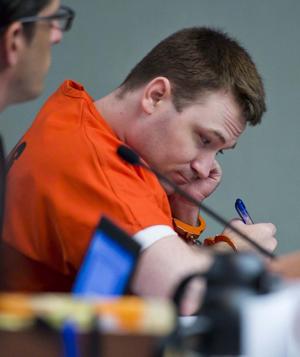Judge
in Thuesen Capital Murder Trial Calls for Punishment
Reversal
BRYAN - In
2010, John Thuesen was sentenced to die for the 2009
murders of a pair of siblings in College Station. Now, the
judge who presided over the trial is recommending that the
punishment be reversed.
In a filing to the Texas Court of
Criminal Appeals in Austin on Friday, 272nd District Court
Judge Travis Bryan III writes of what he believes were
numerous failings by the attorneys who represented Thuesen
at trial, Billy Carter and Michele Esparza, and recommends
a new punishment phase for Thuesen.
In June 2014, Judge Bryan heard
arguments from writ lawyers representing Thuesen, which
Bryan largely agreed with in Friday's filing. Some
arguments by the writ lawyers were rejected.
Thuesen shot and killed Rachel Joiner,
who he had dated, and Rachel's brother Travis in the
siblings' house. The Joiners were from West Texas and
attending Texas A&M. Thuesen had broken into the
Joiner's house and waited for Rachel to return. The two
eventually got into an argument. Evidence showed Rachel
was shot in the back. It was presented that she was trying
to leave the argument and the house when she was shot, and
that when the shots rang out, Travis Joiner came out from
his room and was also shot by Thuesen.
Prosecutors argued that Thuesen, who
called 911 and confessed to the shooting immediately after,
was jealous and angry that Joiner had separated from him.
Thuesen served in the Marines and had
spent time in combat in Iraq. While the defense made
arguments that mental health problems were at the root of
Thuesen's acts and could be cause for the jury to choose a
life sentence instead of death, Judge Bryan does not
believe near enough was done by Carter and Esparza.
In a stinging indictment of the
attorneys' work, Bryan gave the following opinions:
- The defense didn't start an
investigation into Thuesen's Post Traumatic Stress (PTS)
until a few months leading up to the trial, a year after
the lawyers were retained as counsel.
- Thuesen's counsel did not get the
assistance of an expert witness or witnesses qualified to
explain mitigating impacts of PTS.
- The defense's ultimate presentation of
information on PTS, including specific info on Thuesen's,
was "significantly incomplete."
- The investigation and presentation of
evidence that the Department of Veterans Affairs failed to
properly diagnose and treat Thuesen's PTS "fell below
the norms of professional standards for capital counsel."
- Defense counsel did not present
sufficient evidence that Thuesen would not pose a future
danger to others, one of the three questions the jury is
asked to answer in choosing life in prison or death as a
penalty.
- The defense did not speak to witnesses
of an incident Thuesen was involved in during his high
school years that would have disputed a prosecution
witness' account, nor did they cross examine the witness.
The incident was used by the prosecution to convince the
jury that Thuesen had violent tendencies before his war
service.
- Thuesen's attorneys were ineffective
during the jury selection process in fighting for and
against potential jurors who could have helped or hurt the
defense in the deliberations.
- The defense didn't present enough
evidence concerning the Thuesen family's history of mental
illness.
- Defense counsel didn't raise the issue
of mental illness in its opening argument in the
punishment phase.
- Carter and Esparza didn't object to a
prosecutor's comment about his stepfather's World War II
service and PTS during closing arguments in the punishment
phase.
In an automatic appeal granted by law to
any defendant sentenced to death, the Texas Court of
Criminal Appeals upheld the conviction in February 2014.
The only possible punishments the State
of Texas allows for people convicted of capital murder are
life in prison without possibility of parole or the death
penalty. The prosecution has the option not to pursue
death.
Thuesen's case was considered capital
murder because two people were killed in the same incident.
Because of the case's status, Bryan
could not comment on his recommendation. News 3 has calls
in to Carter and Esparza for comments, and has also called
the Court of Criminal Appeals in regards to a possible
timeline on its ruling on the Thuesen case. This story
will be updated when and if those additional details and
comments come in.
